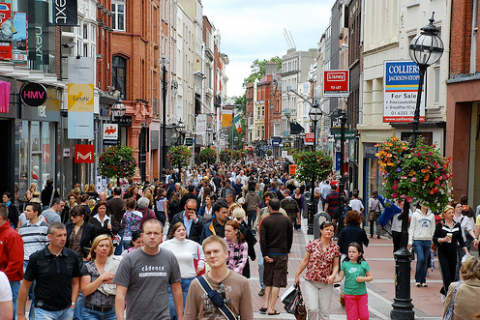Society is more corrupt than its scapegoats

Moral failures in public life are nothing compared to a rich-poor divide that is literally a matter of life and death, writes Vincent Browne.
The spectacle on Prime Time Investigates of mega-developers trying to secure their wealth by transferring assets to their spouses, assets now properly the property of the State, while continuing to live lavish lifestyles with helicopters and limousines, was great television. But all this drama misses the point.
A recital of the catalogue of corrupt politicians and the litany of their misdeeds can also be therapeutic but that too misses the point, a very big point. Calls for confessions and admissions of guilt on the part of bankers, developers, regulators and Ministers are fine too, but they miss the point.
There are now available legal mechanisms for reversing transfers of assets to avoid legal debts. Even if there were no such legal remedies available, the big point would still be missed, although the inadequacy of the law and/or the failure to enforce the law on white-collar criminals would remain an important issue.
Political corruption is small fry here. There is no evidence of any political corruption having had any influence on the crisis that has emerged, certainly not in the form of anyone getting a backhander for rigging the system in favour of those who did most harm. If that was what was at the heart of our present crisis, we wouldn't have much of a problem: just enforce more transparency on the finances of officeholders and all would be fine. But that's not the problem or the point.
As for confessions and admissions of culpability, those would be satisfying but to what point?
Anyway, the problem is not of personal culpability or guilt, although there has been some of that. The problem is systemic and there is nobody around alone responsible for the system. It is a mindset, a cultural thing, an ideology.
The real corruption here is the nature of our society; it's a systemic thing, not something particular to some individuals in politics or in banking or in property or whatever.
Did you see the Central Statistics Office report published a week ago, Mortality Differentials in Ireland? An analysis based on the census characteristics of persons who died in the 12-month period after census day in April 2006, it states: "The life expectancy at birth of males living in the most deprived areas in the State was 73.7 years in 2006/2007, compared with 78 years for those living in the most affluent areas." In other words, rich men live, on average, more than four years longer than poor men. It showed that rich women lived nearly three years longer than poor women.
It went on to say: "Social class was also a powerful predictor of life expectancy with male professional workers having a life expectancy at birth of 81.4 years, 6.1 years higher than their unskilled counterparts."
Isn't there something corrupt about a society where, at the most basic level of welfare, life expectancy, there are such huge differentials because of inequality? It isn't that we haven't known about this for some time.
The Institute of Public Health published a report back in 2001 entitled Inequalities in Mortality 1989-1998. It stated: "In both the North and the South the all causes mortality rate in the lowest occupational class was 100 per cent to 200 per cent higher than the rate in the higher occupational class."
It went on to detail how in relation to all causes of death the mortality rate was higher, much higher, from the lower occupational class as compared with the higher.
How do these realities not speak of a deeply corrupt society?
And how is it that these realities that speak of the insidiousness of the huge inequality here do not figure at all in our public debate? Instead, we get het up about the personal moralities of public figures, as though the personal morality of politicians were of greater consequence than the public morality of our society.
It is the inequality and the ideology that drives it that has caused this disparity in life itself and that has conditioned us to ignore this shocking reality.
It is the same ideology that has caused the financial crisis.
The mentality that studiously ignores the mortalities scandal is the mentality that ordains that some must be paid hundreds of times more than others, even a thousand times; that ordains that the poor must pay "their" share for the crisis (what is "their" share? How did they "they" cause the crisis?).
And it was this ideology that drove the bankers and developers into recklessness and that conditioned the regulators and the Ministers to pay no attention.
It's the ideology, stupid!
